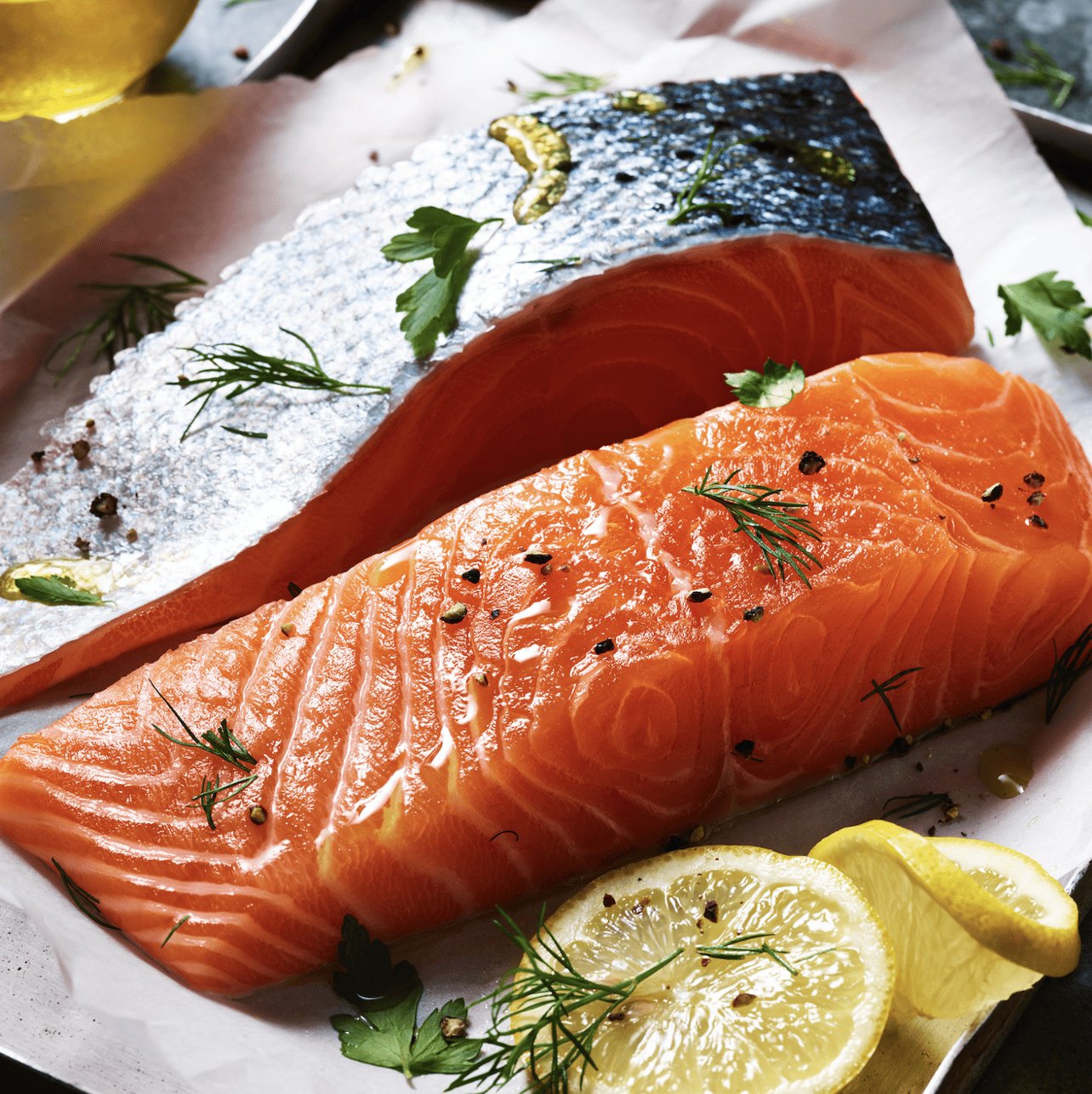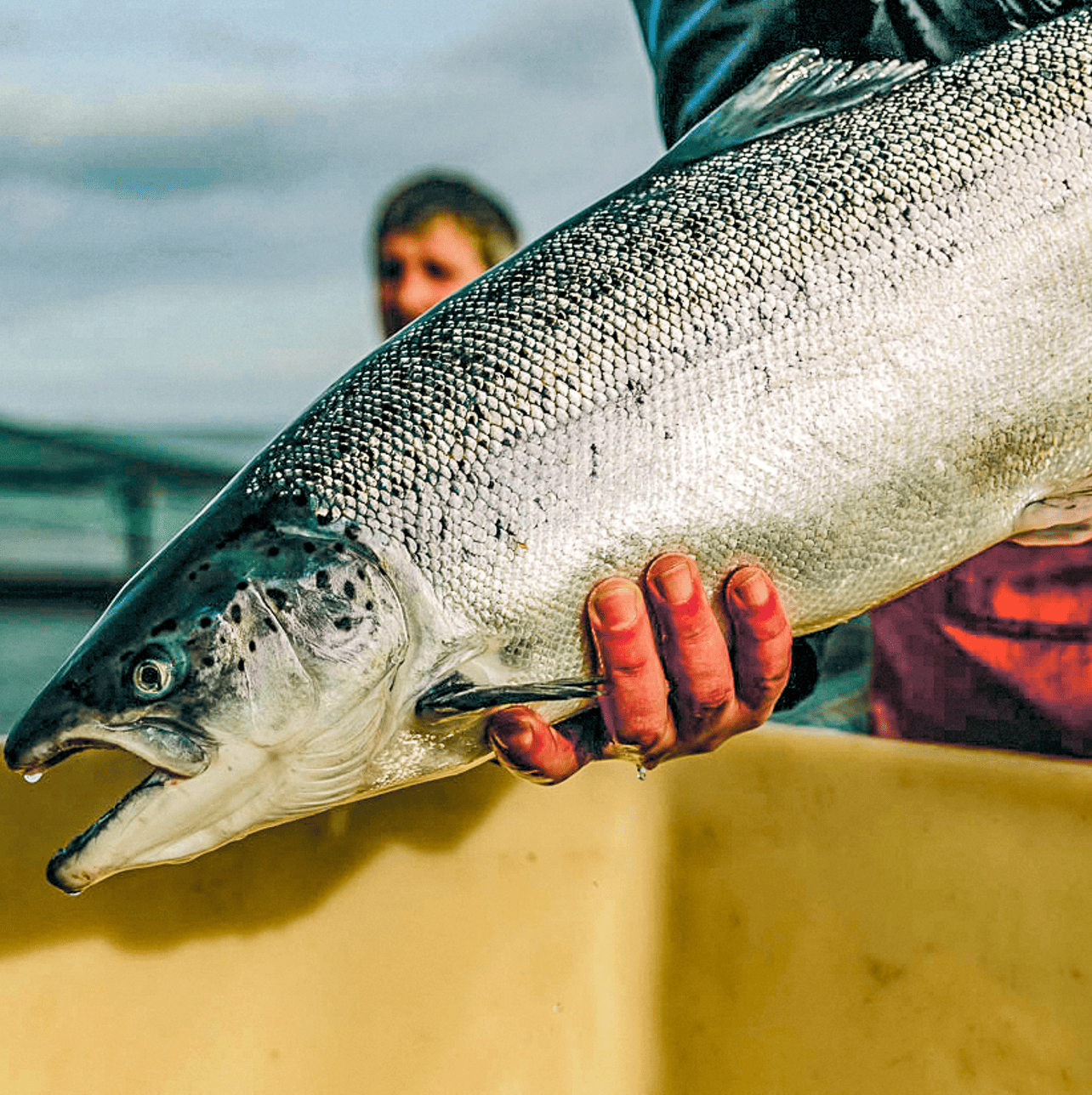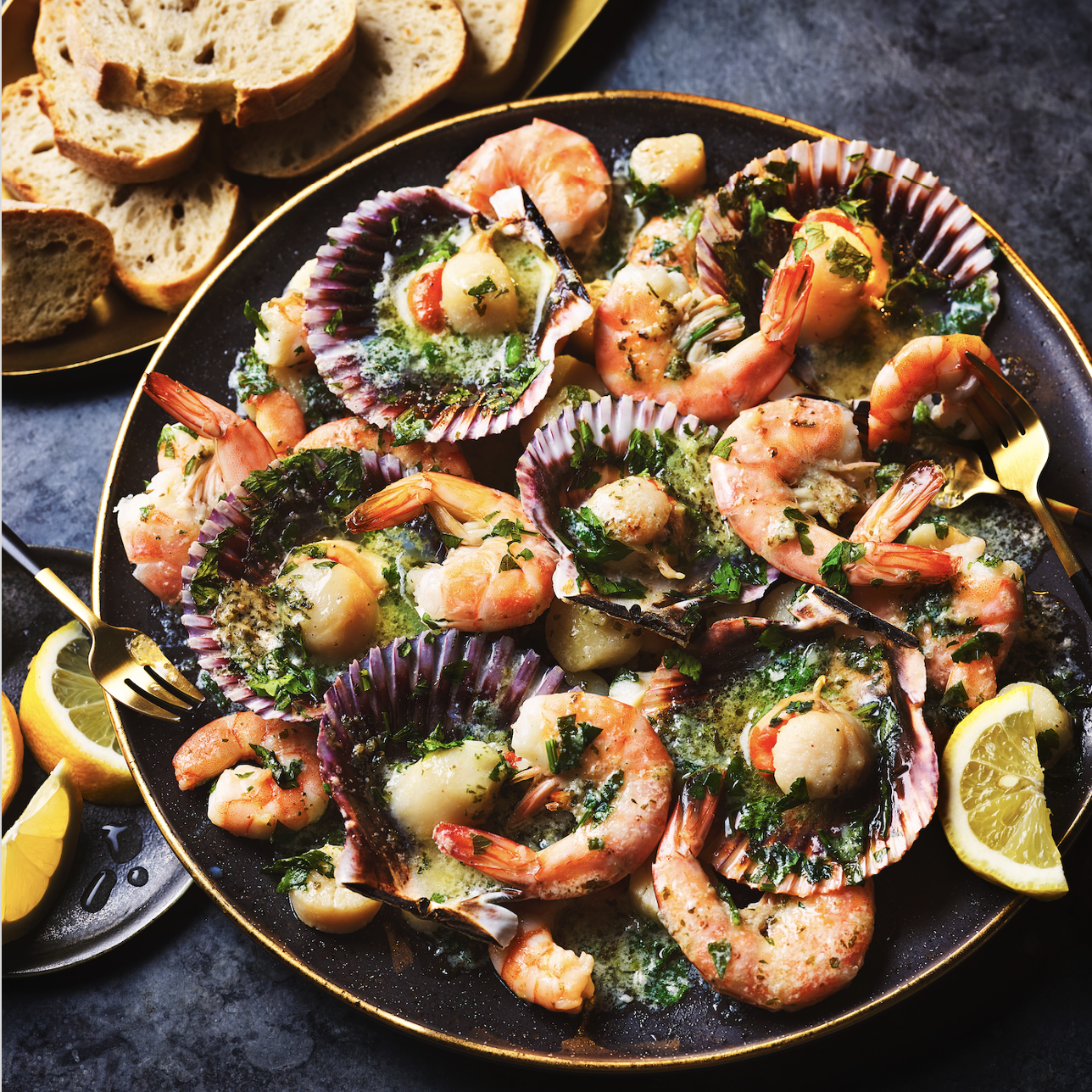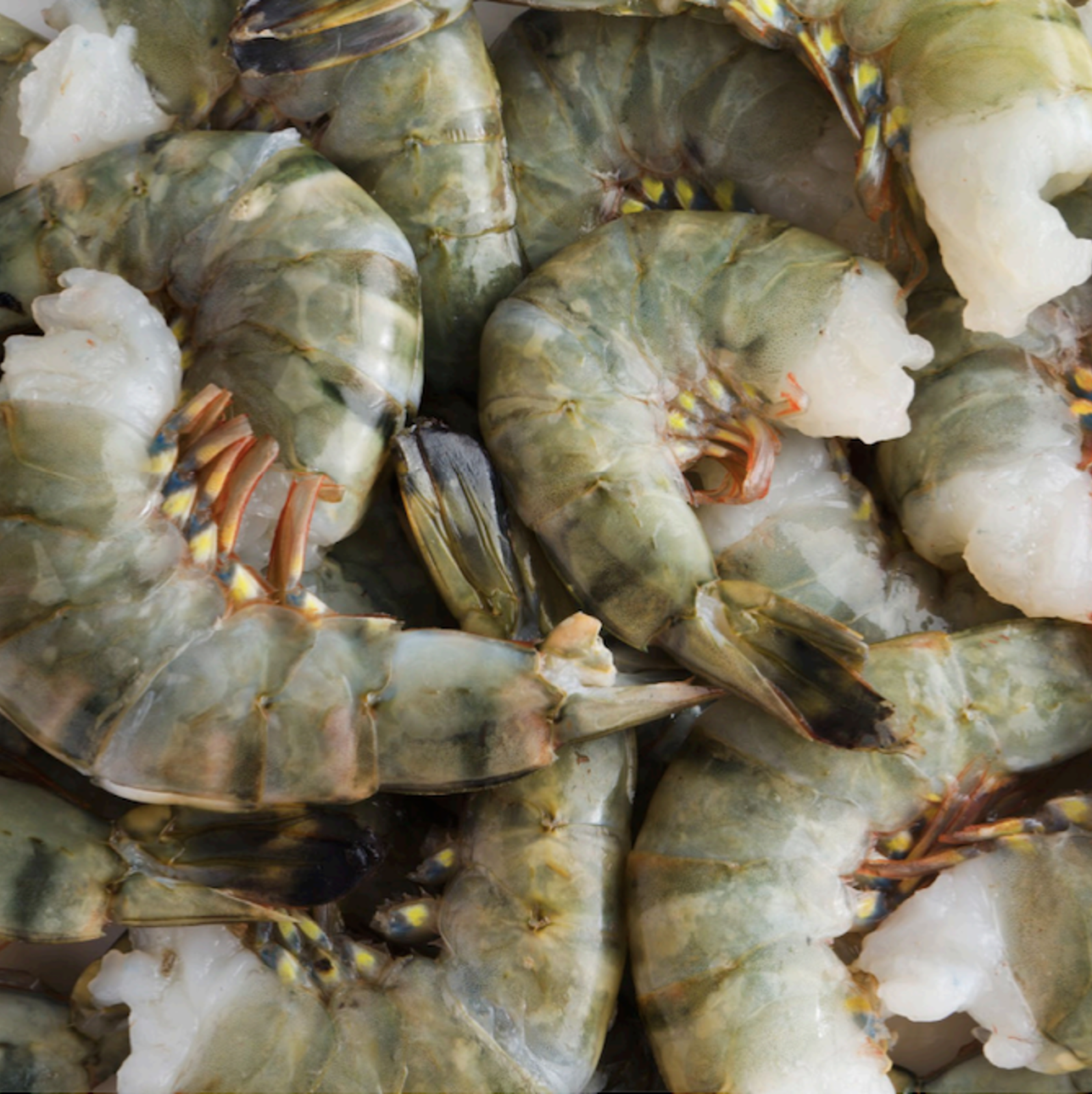Since the development of modern technology in the fishing industry in the 1950s, there has been a significant impact on the marine environment and over-fishing has depleted stocks of many species. Irresponsible fishing practices can also harm other sea life and habitats and waste millions of tonnes of non-target fish each year. Fish farming (aquaculture) is a relatively young and evolving industry. Although it continues to bring many positive sustainability benefits, and is now responsible for more than 50% of all seafood produced for human consumption, aquaculture has also impacted coastal habitats, lakes and rivers through, amongst other things, disease management, excessive waste, unsustainable aquafeed, and mangrove clearance.
Our approach
We use close to 50,000 tonnes of seafood (whole weight) annually with approximately 52% wild caught and the remainder farmed. Our aim is to ensure that all wild-caught and farmed seafood and aquafeed, including M&S Scottish salmon, Organic Salmon and trout, come from the most responsibly managed sources.

This helps safeguard our supply chains and aquatic ecosystems, as well as livelihoods in coastal communities. We only work with fisheries and farms that meet our M&S Seafood Sourcing Standard for Wild-Caught, Farmed Fish & Shellfish, which covers all fish and shellfish found in M&S products – be it fresh, frozen, canned or within our meals. All of the salmon and trout we sell is responsibly sourced and Scottish.100% of our salmon and trout is certified to RSPCA Assured standards.
We source 31 wild-caught species ranging from Atlantic cod, haddock, plaice and lemon sole to Orkney crab and cold-water prawns, and 12 farmed species (Atlantic salmon, rainbow trout, seabass, seabream, halibut, pangasius, blue mussels, Chilean mussels, black tiger shrimp, white leg shrimp, oysters and scallops)
We are committed to providing a high level of transparency about our fish and seafood policies and the sustainability status of the species we sell. M&S was the first UK retailer to report our seafood sourcing since the launch of the Forever Fish campaign in 2012 and we are the first retailer to disclose the information of our primary suppliers. We communicate to our customers and the public via a number of channels including this website, in-store décor and on pack messages. In 2023/24, 94% of wild-caught fish and shellfish sourced for M&S products came from either a Global Sustainable Seafood Initiative (GSSI) recognised third-party certified source, or engaged in improvement actions, with the remaining 0.6% working with WWF towards improvement. 100% of farmed fish and shellfish sourced for M&S products came from third party certified sources.
We use our Forever Fish logo on pack to communicate to our customers that we source all fish and shellfish responsibly. When assessing a fishery or farm we go beyond certification in our assessments and take a seascape approach considering multiple factors to make sure we can be confident we are sourcing responsibly.
As well as supporting larger fisheries and third-party certification schemes, we actively support small scale and artisanal fisheries and the communities relying on them to develop their fisheries and get recognition for their good practice. This is an area we will be more actively supporting in the future through some of our supply base.

Our partners
Listening, learning, responding and working in partnership are an important part of how we do business. We’re working with organisations such as WWF and the Marine Conservation Society to source our fish responsibly.
To develop our approach to sourcing fish and seafood more responsibly, we’ve worked with many partners, including WWF, the Marine Conservation Society, the Marine Stewardship Council, Sustainable Fisheries Partnership, International Pole and Line Foundation, Scottish Aquaculture Research Forum (SARF), MarinTrust, Greenpeace, Blue Marine Foundation, International Pole and Line Foundation and FAI Farms, as well as industry experts and scientists. Operationally, we’re supported by suppliers and expert organisations such as WWF, RSPCA, and specialist independent audit companies to implement our policies.
We have been working with WWF since 2004. We work closely with WWF on various initiatives to promote sustainable seafood. In January 2010, we became the first UK company to sign up to the WWF Seafood Charter, and in 2021 we joined WWF's Retailers Commitment to Nature with a pledge to halve the environmental impact of the average UK grocery shop according to WWF's basket metric - which includes seafood. Through our partnership M&S and WWF work to advocate the Seascape Approach for all supply chains, and to take a leadership role in bringing improvements to fisheries and aquaculture operations globally.
We are also a founding member of multiple sustainable fishing organisations including the Sustainable Seafood Coalition, a cross-industry group in the UK, using our influence as seafood businesses to tackle seafood sustainability issues since 2012 – and the Global Sustainable Seafood Initiative, Global Tuna Alliance Initiative, North Atlantic Pelagic Advocacy Group and are members of the International Pole and Line Foundation and the Seafood Ethics Action (SEA) Alliance.
We are united in a vision for sustainable seafood and have pledged to work together to achieve this.
We sit on the Board of Trustees for Fisheries Innovation Scotland and are active participants in a number of Fisheries Improvement Projects including Orkney crab, Moroccan sardines, Moroccan anchovies, Canadian cod, Indonesian skipjack x2, Project UK monkfish, Project UK lemon sole, Project UK nephrops, NAPA mackerel, SA albacore tuna.
Our policies and standards
We have maintained an industry-leading sustainable fish sourcing policy for over 19 years.
Sourcing seafood responsibly, from healthy, well-managed fisheries and farms, helps safeguard our supply chains and aquatic ecosystems as well as the rights of workers and livelihoods of coastal communities.
Throughout our participation in WWF's Retailers Commitment to Nature, we are working to halve the environmental impact of the UK food shoppers’ baskets by 2030 across seven areas, including seafood, and advocate the Seascape Approach to safeguard ocean health and people. The Seascape Approach, as part of the WWF Basket, takes a holistic approach to addressing seafood sustainability and marine conservation, addressing issues that certification alone cannot solve.
Our Seafood Sourcing Standard for Wild-Caught, Farmed Fish & Shellfish covers every single piece of M&S fish and shellfish on our shelves, be it farmed or wild, fresh or frozen, in a can, a sandwich or a ready meal. And since we are almost exclusively own brand, you will not find branded seafood in our stores with different sourcing standards to our own.

We do not source any species that are listed under the Convention on International Trade in Endangered Species of Wild Fauna and Flora (CITES) or listed on the IUCN Red List of Threatened Species as ‘Endangered’ and ‘Critically Endangered’; or from fisheries and farms.
Our preference is to source from any fishery that has been certified by a third-party sustainability standard that has been formally recognised by the GSSI. Where it is not possible to source from GSSI recognised certified sources (e.g. they are not available), we work with WWF to select the most responsible fisheries to source from. In these instances, fisheries must be in a Fishery Improvement Project or in lieu of this be able to demonstrate that they have specific sustainability management measures in place. For example, all our tuna must be line caught and all of our skipjack tuna is caught by pole and line.
We want to protect marine biodiversity and eliminate the trade of protected and endangered species. We also take measures to ensure that all the seafood we source has been legally caught, landed and farmed and that the processes involved in catching or farming it have not damaged the marine or freshwater environment.
We support the ban of shark finning in our supply base and it is a requirement for our suppliers to have a Fins Naturally Attached (FNA) policy.
We have established clear requirements on human rights at sea, marine protected areas, fish stocks, illegal, unreported, and unregulated (IUU) fishing, fishery policy management, discards, sourcing of endangered and threatened species and fishing gears.
We have signed the EJF Charter for Transparency. To find out more, head to our Human Rights and Responsible Sourcing page.
We work with WWF to annually review the performance of our seafood species through sustainability analysis and evaluation on a fishery by fishery, supplier by supplier basis. Assessments are completed using the most up-to-date and publicly available information by specialist WWF staff or external technical advisers. All new fish and shellfish species are required to be evaluated prior to being accepted by M&S based on the sustainability analysis.
We have worked with WWF to start collecting information from suppliers in line with the Seascape Approach and to inform progress against the WWF Basket marine outcome. This has also aligned with the 10 environmental and social indicators of the Risky Seafood Business report on supplying fisheries and farms on:
- Direct impact to resource
- Ecosystem impact
- Climate change impact
- ETP species impact
- Social concerns
- Management effectiveness
- Sustainability certification progress
- IUU fishing
- Rule of law
- Labour rights
- Find out more about our wild-caught seafood assessment methodology.
- Find out more about our position on Indian Ocean Tuna
- Find out more about where our wild-caught species are sourced from.
We are committed to achieving full traceability of all our seafood and aquafeed. Traceability checks are conducted frequently to make sure we are able to trace farmed species back to the farm that produced them, wild fish to vessel or the group of vessels that caught them, and aquafeed and its key ingredients back to the factories that manufactured them. We also carry out random testing of our seafood products to verify the species labelling, for example DNA analysis. Discover the origin of our select fisheries and farms and find out more about where our wild-caught species and farmed species are sourced from.
Our full requirements are set out in our Seafood Sourcing Standard for Wild-Caught, Farmed Fish & Shellfish which is orientated around a number of sourcing principles. These principles are communicated to our supply base and are incorporated into our supporting Codes of Practice and Guidelines. We are committed to implementing these principles and we verify supplier compliance.
Suppliers of fish and seafood products are also required to comply with our Technical Terms of Trade, Food Human Rights Requirement and our Global Sourcing Principles. Find out more about our approach to supplier management.
The following minimum standards exist across our entire farmed seafood supply chain:
- We require complete supply chain traceability.
- As a minimum all our farms must meet at least one of the following standards: Aquaculture Stewardship Council (ASC) certified, Marine Stewardship Council (MSC) certified (relevant to certain farmed species such as rope grown mussels), Global GAP Aquaculture Standard assured, Best Aquaculture Practices (BAP) certified, or RSPCA Assured. We’ve adopted these as our base standards in recognition of the fact that we source in different locations and markets around the world.
- Compliance with our M&S Select Farm Sourcing Standards.
Modern aquaculture is relatively new, is expanding quickly and globally now accounts for more than 50% of all seafood produced for human consumption. While it is critical to the future of sustainable seafood, the development of this industry continues to present environmental, social and technical challenges. These challenges are global but are very location specific. For example, fish farms can result in the discharge of chemicals used to disinfect production facilities or treat disease, and they can also have social and animal welfare impacts.
Our aim is to be at the leading edge in all our aquaculture supply chains and support them in a process of continual improvement. We have developed Select Farm Sourcing Standards which are set out in species-specific Codes of Practice. These are our minimum standards and have been developed in collaboration with suppliers, industry experts and NGOs. They cover criteria such as site selection, environmental management, rearing of fish, fish health and welfare (including slaughter), the use of chemicals, waste disposal, employee welfare and broader community requirements.
All producers of farmed fish and seafood for M&S must be in full compliance with the relevant Select Farm Sourcing Standard.
We have currently developed nine Select Farm Sourcing Standards on salmon, organic salmon, seabream & seabass, rainbow trout, mussels, oysters, farmed shrimp, pangasius and halibut.
We are committed to ensuring that the highest standards of animal welfare are adhered to in all our supply chains.
We have a long-term partnership with FAI Farms who provide us with animal welfare knowledge and direction and are responsible for managing our independent data collection and supply chain research and outcome measures.
Our Select Farm Sourcing Standards have been designed to support our suppliers to meet our high standards on animal welfare. These are based upon the Five Freedoms recommended by the UK Farm Animal Welfare Committee:
- Freedom from hunger and thirst
- Freedom from discomfort
- Freedom from pain, injury or disease
- Freedom to express normal behaviour
- Freedom from fear and distress
Our farms must be committed to rearing, handling, transport and slaughter under conditions of minimum stress, with minimal environmental impact and with full regard to animal welfare. Each site must also have a Veterinary Health Plan in place.
We require all sites to have and implement a site-specific Predator Exclusion Plan which is based on risk assessment and includes the potential physical interactions with local marine/ freshwater and avian wildlife. Measures must prevent predator problems occurring. These plans are required to be reviewed annually.
Medication such as antibiotics must not be used to promote growth or as an alternative to good husbandry practices (i.e. prophylactic use). However, fish displaying clinical symptoms can be treated with appropriate veterinary supervision. The fish cannot be harvested before all traces have faded. As an added precaution, if fish have required treatment, a sample is taken to ensure no medicine remains in the fish at the time of harvest. No hormones are used in the rearing of any of our farmed seafood.
Techniques for the harvesting and slaughter of farmed fish and seafood are evolving quickly. Methods used tend to be species specific and often depend on the size of the animals being harvested and slaughtered. We are committed to the adoption of best practice and to driving positive change in all our supply chains, with a common denominator being minimising stress and always with regard to good animal welfare. We are working closely with SAGB to support the work on Animal Welfare (Sentience) Bill development. You can learn more about the welfare of our aquaculture and wild decapod crustaceans here. We were recognised as the leading company in decapod welfare in the 2023 benchmark for our commitment to improving the welfare of the decapods we source. We have continued to prioritise this work and hope to continue in our leadership position in 2024.
We record welfare outcome measures for several species within our farmed fish supply chains. This data is collected on all M&S Select animals and independently collated by FAI Farms (see below).
All of our Salmon, organic salmon and Trout are already RSPCA assured and we have plans to roll this out into other species soon.
Most aquafeeds still contain some marine ingredients, i.e. fish meal and fish oil. The level varies depending on the nutritional needs of the species being farmed and it also reflects species-specific research and development in fish nutrition. Significant advances are continuously being made in bringing down the level of marine ingredients used in aquafeed. A major driver behind the use of marine ingredients is maintaining a high health status of the species being farmed. Unfortunately, in some parts of the world the sourcing of these ingredients may result in environmental degradation, destructive fishing practices or human rights issues.
Our goal is to better understand the ingredients used within our aquafeeds and the impacts associated with these ingredients so that we can make informed decisions. We support research and initiatives aimed at improving the efficiency and sustainability of aquafeeds.
We require all aquafeed fed to farmed aquatic animals that enter the M&S supply chain to be purchased from an M&S-approved aquafeed manufacturer. These approved suppliers must comply with our Select Farm Sourcing Standard – Aquafeed Manufacture. This specifies the standards, procedures and practices to be followed by approved suppliers in the manufacture of aquafeeds used in our supply chain.
We do offer some farmed species that need little or no marine ingredients (e.g. pangasius) and others that don’t need any man-made aquafeed (e.g. mussels and oysters), and we are continually working with our suppliers to develop new products using farmed species that are at lower trophic levels.
Alternative/Non-marine ingredients
Alternative ingredients do exist but are not necessarily without issue. For example, soy is an important protein-rich alternative to fishmeal but is classed as a forest risk commodity. And ingredients such as algae derived oils are yet to become competitively priced for full replacement commercially viable and are of limited availability.
We work closely with our feed partners on feed innovations including the use of algal oil, circular fish meal and oils and soy alternatives.
Agricultural crop ingredients, such as soy, should be sourced from sources which do not contribute to deforestation. Find out more about our approach to soy and palm oil.
Marine ingredients
Marine ingredients used in the production of feed should be sourced from locations certified to MarinTrust Standard (formerly known as the International Fishmeal and Fish Oil Organisation’s Standard for Responsible Supply (IFFO RS)) or the MSC standard.
Where it is not possible to source certified marine ingredients, our suppliers must be able to demonstrate that they are working towards full traceability and compliance with our Seafood Sourcing Policy.
We also actively encourage, and have made good progress with, the use of fishmeal and fish oil derived from fish trimmings rather than from whole fish.

